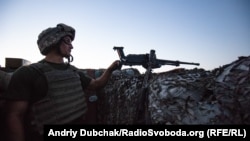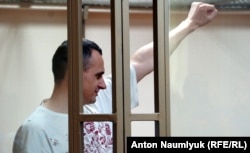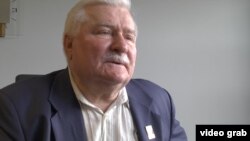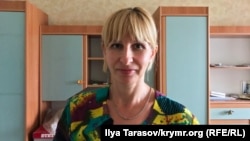Pink Floyd's Roger Waters Backs Russian Takeover Of Crimea, Causing Backlash
The co-founder of the rock band Pink Floyd, Roger Waters, has expressed support for Russia's 2014 annexation of Ukraine's Crimea Peninsula, causing a backlash in Ukraine.
The Ukrainian nongovernmental organization Myrotvorets (Peacemaker), which aims to inform local law enforcers about foreign citizens who allegedly commit crimes against Ukraine, put Waters on its unofficial blacklist late on August 27.
The group is accusing Rogers of engaging in anti-Ukrainian propaganda, violating Ukraine's territorial integrity, and attempting to justify the illegal annexation of Crimea.
Ukrainian authorities have not responded to the British rock musician's statements.
In an interview published by the Russian daily newspaper Izvestia, Waters defended the annexation, saying that "many agreements and other papers" exist that prove Russia's claims for Sevastopol, a major military port in Crimea.
He went on to say that Moscow's actions were "provoked" by the ouster of Ukraine's pro-Russian President Viktor Yanukovych by street protests in 2014, which he claimed were orchestrated by Washington.
Waters' statements echo the Kremlin's rhetoric justifying the takeover of Crimea, and have enraged many people in Ukraine.
Since Russia seized Crimea, a number of international entertainment personalities have ended up on Peacemaker's blacklist. In some cases, Ukrainian authorities also take action, banning entertainers who have publicly supported the annexation from entering the country.
Those targeted with bans include French actor Gerard Depardieu and Serbian filmmaker and musician Emir Kusturica.
Waters performed in St. Petersburg on August 29 and is scheduled to do so in Moscow on August 31. His band has already performed in Moscow twice, in 2006 and 2011.
Based on reporting by Billboard Magazine and Interfax
Fighting Picks Up In Eastern Ukraine, Despite Calls For School-Year Truce
Fighting in eastern Ukraine has flared up, despite renewed calls for peace at the start of the school year, the Organization for Security and Cooperation in Europe said on August 29.
There have been "more than 70 cease-fire violations" in the fighting between the Ukrainian military and Russia-backed separatists since the purported truce began, said the organization, which deploys unarmed monitors in the conflict zone in eastern Ukraine.
The "sides need to honor their recommitment" for peace, the OSCE said. "Firing has to stop now, to protect Ukrainians on both sides of the contact line."
Last week, the Ukrainian military said that at least four of its soldiers had been killed as fighting escalated, despite renewed commitments to a school-year truce.
The day before that announcement, the OSCE had said this was the "calmest summer since the beginning of the conflict" in 2014, with no civilian fatalities recorded up to that point.
The conflict erupted after Ukraine ousted its pro-Russian president in a pivot to the West in 2014. More than 10,300 people have been killed, according to estimates by the United Nations.
Russian President Vladimir Putin, who has backed the separatists in peace talks, indicated support this month for a potential UN peacekeeping mission in the conflict area.
German Chancellor Angela Merkel, who has led the repeated extension of European Union sanctions on Russia in an effort to pressure the Kremlin into ending the conflict, has also expressed support for a peacekeeping mission.
Ukraine has also proposed introducing UN peacekeepers, but its proposal is far broader than Russia's and periodic talks on ending the conflict have not narrowed the differences.
Based on reporting by dpa and Interfax
That concludes our live-blogging of the Ukraine crisis for Wednesday, August 29, 2018. Check back here tomorrow morning for more of our continuing coverage.
'It Is Good There Are People Like You': Walesa Nominates Sentsov For Nobel Peace Prize
By RFE/RL's Ukrainian Service
Lech Walesa, the former Polish president and Nobel laureate, said he has nominated Ukrainian filmmaker Oleh Sentsov, who is imprisoned in Russia, for the Nobel Peace Prize.
Walesa told RFE/RL’s Ukrainian Service that he sees similarities between Sentsov’s situation and his own in the 1980s, when he was imprisoned by Polish authorities for his work as the leader of the Solidarity trade union.
“I was also in a difficult situation,” Walesa said in an interview published on August 29. “I also struggled. This award (Nobel Peace Prize) helped me, as well as Poland, in regaining freedom.
“For this reason, support is needed. First of all, thanking him for fighting. Secondly, encouraging him to continue his peaceful struggle.”
A filmmaker who was a vocal opponent of Russia’s 2014 annexation of Crimea, Sentsov was arrested in Crimea that year and convicted the following year by a Russian court of planning to commit terrorist acts. He was sentenced to 20 years in prison.
His plight has drawn international support and calls from Western governments for him to be released.
He has been on hunger strike in a remote Russian prison since May 14.
Walesa, who was awarded the Peace Prize in 1983, said he would tell Sentsov that “you are on the right side.”
“It is good that there are people like you. It gives us hope that the world will improve -- so persevere, no matter what wrongs meet you, persevere, because you give the world an example of the right way to fight,” Walesa said.
Walesa also said the West was not doing enough to help defend Ukraine’s sovereignty against Russia.
“Europe and the world are lacking in solidarity. We did not have plans for these times. This disunity, this discord in Europe and in the world, all this causes us to not address issues such as Ukraine,” he said.
The Norwegian Nobel Committee each year receives several hundred nominations for the Peace Prize. Generally, the names of nominees are not released to the public for 50 years after their submission.
Activist Says Agents Searched Her Home In Crimea, Accused Her Of 'Terrorist Ties'
By the Crimea Desk of RFE/RL's Ukrainian Service
SIMFEROPOL, Ukraine -- Security officials in Russia-annexed Crimea have searched the home of a local Ukrainian activist on suspicion of having ties to “terrorist organizations” in Ukraine.
The activist, Olha Pavlenko, told RFE/RL on August 29 that agents from the Federal Security Service confiscated her mobile phone, flash-memory cards, and notebooks that contained poems.
Pavlenko, a member of the Ukrainian Cultural Center in Crimea, said the search of her home in Crimea’s capital, Simferopol, lasted three hours.
"After my lawyer arrived, I allowed [the FSB officers] to enter and they showed me a warrant saying that I am suspected of having ties with terrorist organizations based in Ukraine proper," Pavlenko said.
She added that she was ordered to go to the Investigative Committee for questioning and that she will discuss with her lawyers when to report.
There was no confirmation of the search by authorities.
The Ukrainian Culture Center in Crimea is a group promoting Ukrainian culture and language in the region. Its activists have been under pressure since Russia annexed the peninsula in 2014.
One of the center's leaders, Leonid Kuzmin, fled Crimea in 2017 after he received threats from unknown people and was pressured by police.
Russia has prosecuted and imprisoned several Ukrainians on what rights activists say are trumped up, politically motivated charges since Moscow seized the Black Sea region.
In March 2017, the European Parliament called on Russia to free more than 30 Ukrainian citizens who were in prison or subject to other conditions of restricted freedom in Russia, Crimea, and parts of eastern Ukraine that are controlled by Russia-backed separatists.
Russia seized Crimea after Ukrainian President Viktor Yanukovych was pushed from power by massive street protests in February 2014.
Russia also fomented fighting in eastern Ukraine, where more than 10,300 people have been killed since April 2014.








